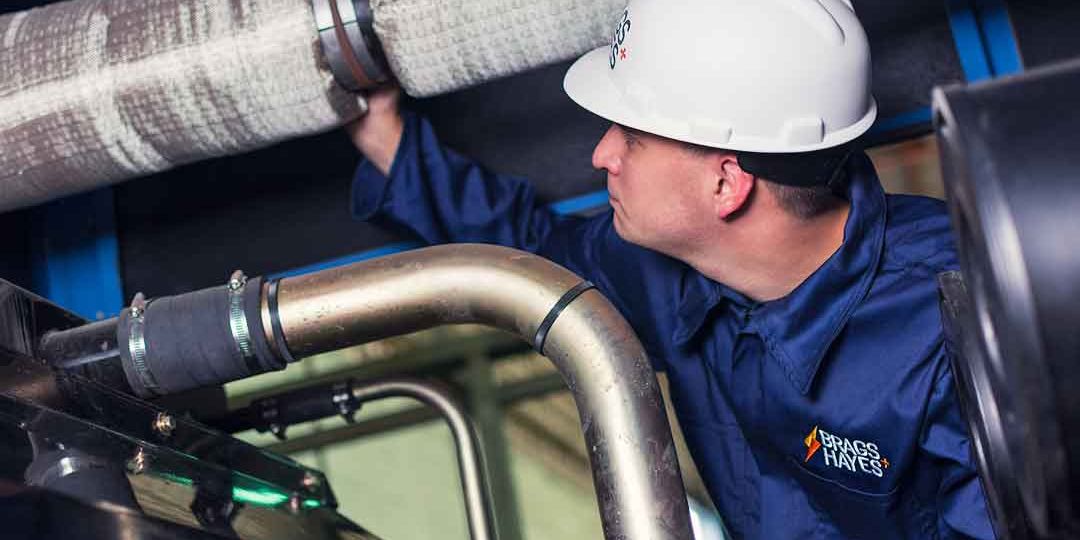
Power generators play an important role in many settings, including schools and government buildings, hospitals, events, construction sites, and many more, providing a backup power source in the event of a power grid failure.
Your generator is the driving force behind the productivity of your industry, business, and peace of mind in your home, so it’s important to make sure it continues to run reliably and efficiently by doing planned preventative maintenance tailored to the type of equipment you’re using.
While it’s a reliable and cost-effective source of backup power, neglecting to properly maintain a power generator increases the risk of failure when it’s needed most.
In this article, we’ll go over our top tips for power generator maintenance, with preventative maintenance recommendations, service and inspection frequencies, as well as considerations when choosing a generator location.
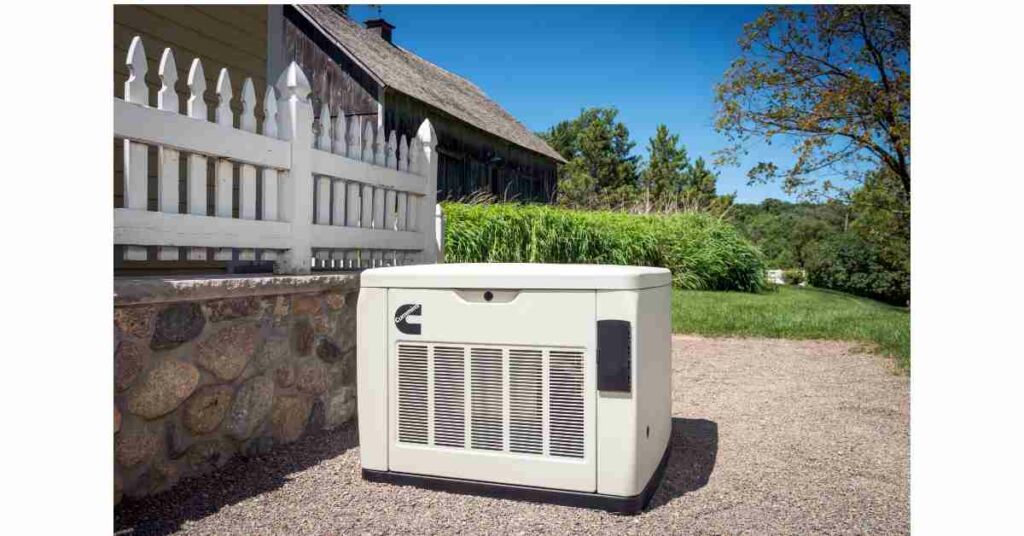
Regardless of how little or how much you have used a standby generator in any given year, it is in your best interest to develop and adhere to a regular generator maintenance schedule.
If you own a power generating equipment and take into account correct and planned preventive maintenance according to the manufacturer’s recommendations, then these are some of the benefits you can expect to obtain:
- Reliability of the power generating equipment restored up to 98.5%
- Reduced risk of forced interruption
- Reduction of generator unavailability from 3 months to one year (depending on the type of component that may fail and its availability on the market)
- Extension of useful life up to 25 years.
Having a proper generator maintenance schedule is crucial, especially if you live in areas prone to severe weather such as tropical storms, snowstorms, and hurricanes. Given the circumstances of increasingly severe climatic changes, we dare to say that there is no part of the world that remains safe from inclement weather.
Preventive maintenance tips for power generators
A power outage is more than a nuisance. It can be devastating for businesses, stopping manufacturing lines and, in some cases, forcing the closure of facilities. In the case of a power generator for your home, it is even more delicate, because in extreme weather conditions (increasingly frequent) the risk can be deadly, as has happened recently.
In addition to regular professional maintenance on diesel generators, there are a number of regular checks you can perform to ensure your generator is running when you need it most. Below is a list:
Battery inspections
When generators are left idle for too long, the batteries can fail during the start-up phase. Also, chargers, connections, and cables can begin to deteriorate, preventing the necessary electrical current from going to the battery. To prevent these types of failures, a visual inspection should be performed to check for leaks, contaminant buildup, and general damage.
Periodic operation of the generator
Even when a generator is not in use, it must be started regularly to prevent the fuel from stagnating and degrading. If a generator is left for more than 6 months without starting, the fuel test must be carried out by a professional technician. Our recommendation is that the generator be turned on at least at the intervals recommended by the product manufacturer. One trend is for manufacturers to recommend running the generator for 30 minutes a week to prevent damage.
Fluid checks
Generators rely on fluids including coolant, lubricants, and fuel to function. The levels of these fluids should be monitored regularly and topped up with the recommended fluid per the manufacturer’s instructions. Also, any leaks in the system should be reported and inspected by a professional technician.
Contaminant verifications
Contaminants found in coolant, lubricating oil, and fuel can cause serious problems inside the generator. Inspect your fluids regularly with a dipstick and run the generator at the manufacturer’s recommended intervals to avoid any stagnation. If you notice any unusual results, call a professional to have your system inspected.
Control panel checks
Before commissioning you must check the control panel of the generator. This will give you an immediate idea of any problems within the system. Before commissioning make sure that “automatic mode” is activated. This is one of the most common and easily preventable reasons why generators won’t start.
Recommended professional service frequencies for power generator
Be sure to design your generator maintenance schedule (see below for a proposed template) at the beginning of hurricane season (August to October), and winter weather season (late October to early March). For example, scheduling your bi-annual professional technical visits in late March/early April and late September/October will ensure that your backup generator is at full operational capacity for each of these trouble seasons. Even if you’ve only been using your generator for a minimum of 30 minutes a week for routine exercise, you need a regular maintenance schedule to make sure you can safely lean on it in the event of an emergency. This is true regardless of whether your standby generator runs on diesel or other gaseous fuel sources.
Recommended professional service frequencies for a diesel generator will depend on its usage and run time. As a general guide, you should aim to perform a complete preventative inspection and service on your generator once every 6 months or every 400 hours of run time.
Carrying out regular visual inspections allows you to be aware of any faults within your system, and may require service sooner than expected. Some of the factors that may result in more frequent maintenance include:
Environment
Exposure to extreme temperatures and weather can damage generator components. If your generator is located in a coastal environment, such as a port or shipyard, care must be taken to avoid excessive exposure to wind-borne saltwater.
Pollutants
Airborne contaminants, such as dust and sand, can infiltrate the generator and damage its internal components. A generator on a construction site or similar environment should require additional service.
Excessive use
Most diesel generators are designed to provide backup power. If a standby generator is used for main power, care must be taken to ensure that the generator is inspected frequently and is only used for as long as necessary.
Lack of use
Conversely, if a generator is left idle for longer than expected an engine workout should be performed to prevent battery and other component failure.
The location of your power generator is key.
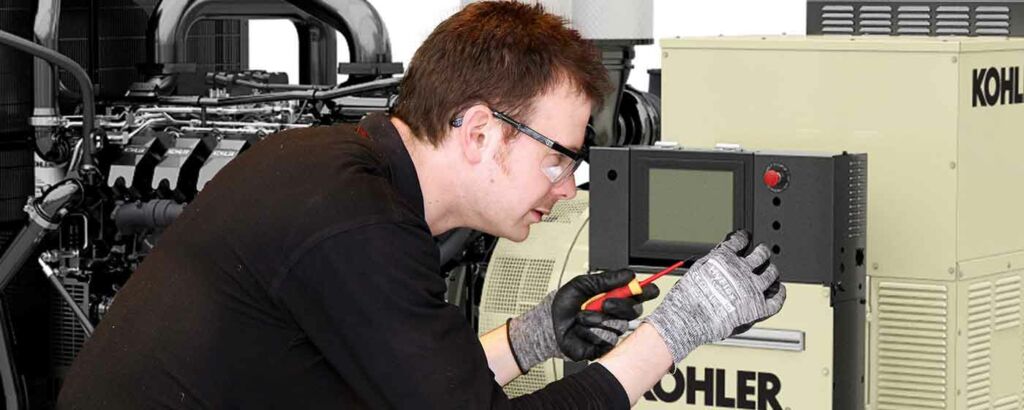
The location of the generator is something that must be carefully considered to avoid any complications during operation or maintenance. Our top tips for proper power generator placement are:
- An adequate space can be located to protect the generator from the elements. In this way, you will guarantee a longer duration of the equipment and minimize service costs over time.
- Avoid placing the generator in an area that is at risk of flooding, strong winds or snowdrifts, and salt spray.
- Make sure the generator has an adequate and unobstructed power source. Excess wiring and piping can increase costs and reduce efficiency.
- Generators require an adequate intake of air to ventilate correctly, since they emit exhaust gases that can be unpleasant and harmful to health. Therefore, be sure to place the generator in an open space with a suitable air source.
- When placing your generator, you must take into account its accessibility. This means that it must have clear and unobstructed access for proper maintenance, refueling, and necessary inspections.
- Generators vibrate when in use, creating a lot of noise. If your generator is running near a residential area, consider vibration isolators to prevent noise pollution.
For any standby generator to maintain maximum efficiency and power, a multi-tiered maintenance program is necessary.
There are maintenance tasks you’ll need to perform on your own both weekly and monthly, and you’ll also need to schedule semi-annual and annual service calls with a certified technician.
Should you stop using your generator, remember that you may need to increase these regular maintenance calls when an emergency occurs, and equally if you are maintaining it in an unusual environment.
If you’re not sure how to plan a maintenance schedule for your generator, and all that that entails, we’re here to help.
This guide that we present here will help you follow the correct steps to carry out the entire process in detail; from when to schedule maintenance to what to do if you inherit a standby generator from a previous owner.
A model preventive maintenance plan
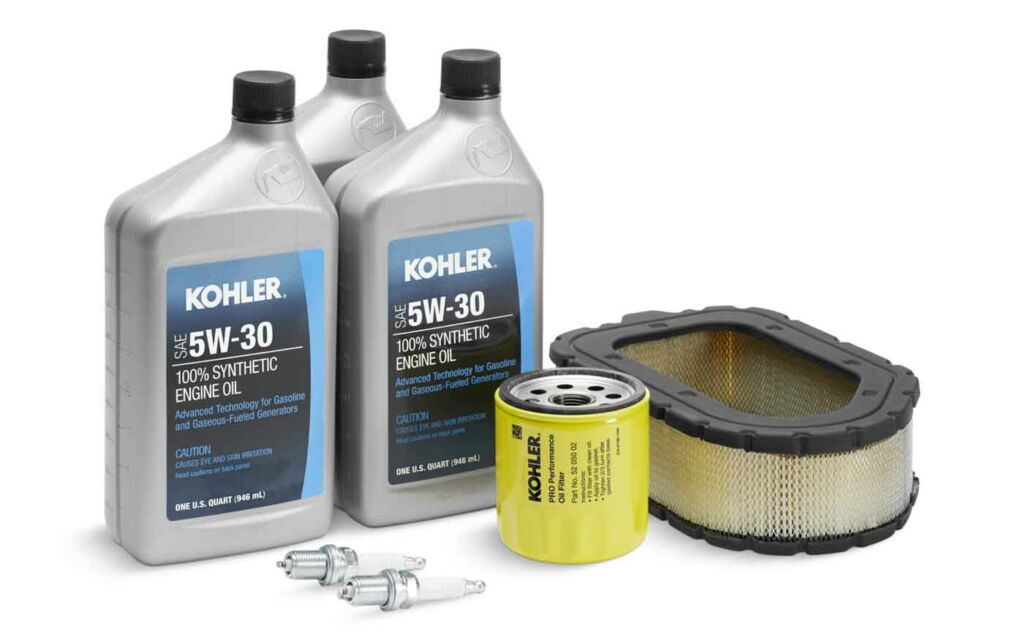
Every maintenance plan for a standby generator should generally be broken down into brief weekly self-inspections, more detailed monthly self-inspections, and technician visits every two years, and every year. Remember that frequent use of your generator may require more frequent self-inspections and technician visits.
To help you in this process we have put together a typical routine maintenance schedule, so that you have an idea of what each inspection should entail:
Generator weekly maintenance schedule
- Start and run the generator, ideally with a no load automatic transfer switch exercise cycle.
- Recheck for fluid leaks around the unit.
- Make sure that there are no alarms on the device and that the generator has worked properly.
- Make sure the generator is properly filled with the correct fuel.
- Make sure the circuit breaker is secure and closed.
- Make sure the generator is primed and ready for automatic start.
You should have an “Auto” mode feature to make this happen.
Monthly generator maintenance schedule
- Perform a complete sweep of the perimeter of the generator, to ensure that there is no trash or debris that could become a hazard in the event of routine operation.
- If you have an enclosed generator, your regular generator maintenance schedule should always include a search for possible intruding animals within the unit, particularly rodents.
- Make sure that the generator oil level is as full as possible without exceeding it.
- The generator must be idle for at least 10 minutes to get an accurate reading.
- Double check the generator overflow tank to ensure you have the correct amount of coolant in the unit.
- Make sure the battery is clean and free of corrosion. Also, make sure it is in proper working order.
- Inspect the generator for loose cables and clamps, and double check the unit terminals and wiring for signs of corrosion.
- If you have a diesel generator, make sure the fuel level is correct and the water separators are properly drained.
- If you have a gas-powered generator, double check the fuel delivery system piping for cracks or other signs of damage.
Generator maintenance semi-annual calendar
(Includes maintenance by a licensed service technician.)
- Complete a full battery diagnostic check. This includes checking the specific gravity and electrolyte level of the battery, and making sure all connectors and cables are in the correct order.
- Examine the entire compound.
- Check all drive belts.
- Check the coolant heater.
- Examine the entire exhaust system, including the tailpipe and muffler.
- Examine the air induction pipes and all related connections.
- Browse the complete AC wiring system and all related accessories.
- Examine the complete DC electrical system, including all related accessories and the control panel.
- Inspect and thoroughly clean all air filter units inside the generator.
- Examine all fuel system hoses and connectors, double-checking for fuel leaks.
- Make sure there are no oil leaks and that all hoses and connectors in the lubrication system are working properly.
- Check all refrigerant lines and connectors.
Generator annual maintenance schedule
(Includes maintenance by an authorized service technician.)
- Complete a visual inspection of your generator’s alternator. Watch for any dirt and excessive moisture.
- Make sure the alternator is not receiving direct heat. Any of these hazards could reduce the winding power of your alternator.
- Completely turn off your transfer switch and do a complete inspection; maintenance if necessary.
- Replace the air filter.
- Replace the fuel filter.
- Replace the generator oil and oil filter.
- Replace the spark plugs.
- Thoroughly clean the crankcase breather.
- Make sure there is the correct concentration of coolant.
- If necessary, flush the entire cooling system.
- Perform load bank tests.
- For diesel generators, fuel test and recondition as necessary.
- For diesel generators, remove all water from the fuel tank.
What should you do if you inherit a generator from a previous owner?
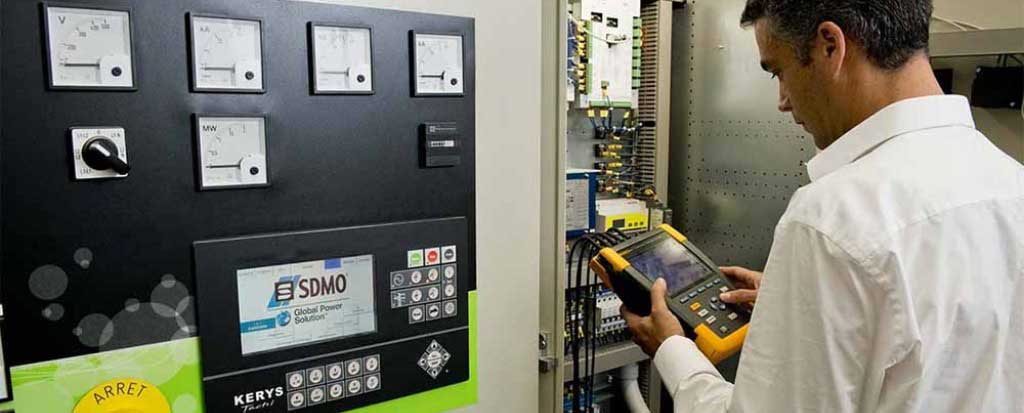
If you are taking over a property or are in possession of a standby generator from a previous owner, you will want to get up to speed on the depth and breadth of the generator maintenance program before you take over the property. That is, assuming the previous owner maintained the generator properly.
Call the previous owner, if possible, and ask if they have details about the regular maintenance schedule for the generator you used. Also, ask for a copy of the last inspection report performed by a licensed technician. This will give you a baseline and help you identify any potential problems with your standby generator before they become full blown in an emergency.
The less information you have about this, the more likely it is that your backup generator will prove problematic when it is brought on line during a storm or power outage.
Understanding the nature of a power generator and paying attention to the required maintenance aspects is crucial to maintaining its reliability and permanent availability as a main or backup power source.
Brags & Hayes Generators offers a wide range of generator preventative maintenance solutions, covering all cooling technologies, all generator sizes and all OEMs.
Local presence, global experience and a strong heritage are the foundation of our universal portfolio of preventive maintenance service solutions for power generators.
At Brags & Hayes we are here to advise you on everything related to backup power generation, what equipment to buy, how to maintain it preventively and how to use it correctly. If you have any questions, you can contact the telephone number +1.954.657.7777, by Whatsapp (in the green icon on the right) and by email to info@bnhgenerators.com.

